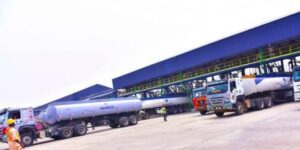

Gas Sector reaping bountifully from fuel subsidy removal – Ekpo
….Says AHL GPP -2, AGPC Projects will boost nation’s industrialisation
Minister of State Petroleum Resources (Gas), Rt. Hon. Ekperikpe Ekpo, has commended President Bola Tinubu for the courage and vision in ending fuel subsidy, saying the decision has led to increased investments in unlocking the Nation’s huge gas potential for the benefit of citizens, the economy and environment.
The Minister stated this in an address at the Presidential Commissioning of Critical Gas Infrastructure Projects with the theme “From Gas to Prosperity, Renewed Hope”on Wednesday in Delta State.
He said: “Mr. President, the decision to eliminate fuel subsidies at the start of your administration has compelled increased spending in upstream and midstream gas development, and the use of gas as an appropriate, more cost-effective, and cleaner alternative to diesel and gasoline. Furthermore, in keeping with the Paris Climate Change agreement, this measure solidifies the use of gas as our transition fuel as we move the Nation towards achieving green energy sufficiency by 2060.”
The Minister appreciated President Tinubu, saying his “inspiring leadership has been the driving force behind our progress towards a future full of opportunity and promise.”
He described the AHL Gas Processing Plant 2 (GPP – 2) and ANOH Gas Processing Company (AGPC) Plant, which were commissioned, as important facets of the Decade of Gas initiative, and a reflection of the NNPC Ltd. and its Joint Venture partners’ efforts.
The Federal Government intervention policy in the gas sector has seen domestic production increased by 800MMscf/day.
On the AHL Gas Processing Plant 2 (GPP – 2), the Minister said it was a Joint Venture (JV) between NNPC Limited and Sterling Exploration and Exploration Company Ltd. (SEEPCO), for the development of the AHL Gas Processing Plant, which will process 200MMscf/d of natural gas.
“In addition to producing over 160,000 metric tonnes of propane and 100,000 metric tonnes of butane annually, this plant promotes rapid industrialization and reduces reliance on LPG import,” he ssid.
Ekpo also had this to say on the ANOH Gas Processing Plant (AGPC):
“With a capacity of 600 million standard cubic feet per day (MMscfd), the ANOH Gas Processing Plant is a shining example of advancement. By processing non-associated gas from the Assa North – Ohaji South field in Imo State, this integrated gas processing plant will produce LPG, condensate, and dry gas. This plant, developed by ANOH Gas Processing Company (AGPC), a joint venture owned by NNPC Limited and Seplat Energy Plc, will greatly enhance the availability of domestic gas, which will boost power generation and hasten industrialization.
The other project which was commissioned is the 23.3km X 36” ANOH-OB3 CTMS Gas Pipeline Project which involved the Engineering, Procurement, and Construction of the 36″ x 23.3km ANOH-OB3 Project as part of the CTMS Gas Pipeline Project (ANOH-OB3).”
According to him, this pipeline will deliver dry gas from the Assa North-Ohaji South primary treatment facility (PTF) into the OB3 pipeline system, which would provide the means evacuating and transmitting the treated gas to both the AKK Pipeline and the Western Domestic Gas Market.



